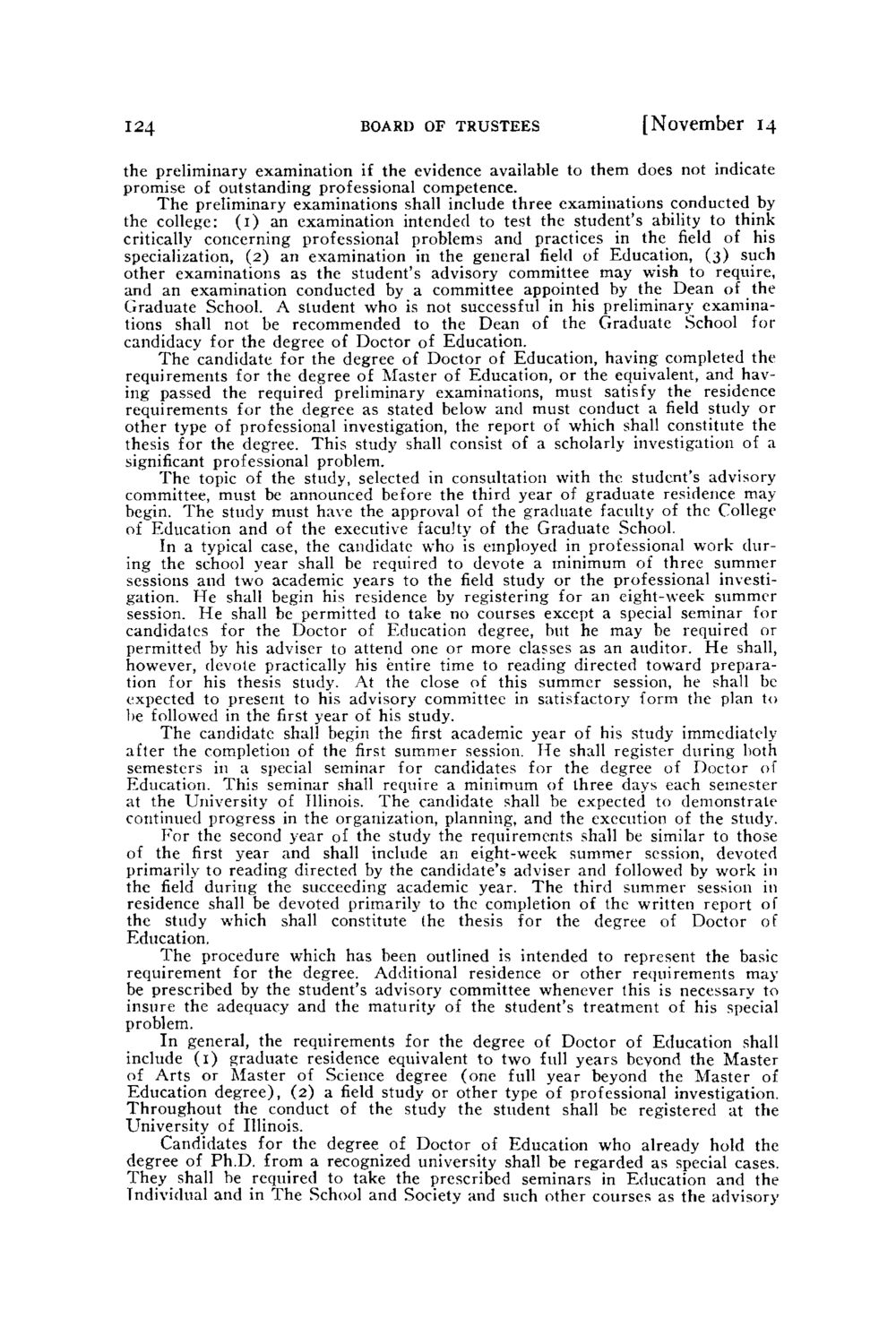| |
| |
Caption: Board of Trustees Minutes - 1942
This is a reduced-resolution page image for fast online browsing.

EXTRACTED TEXT FROM PAGE:
124 BOARD OF TRUSTEES [November 14 the preliminary examination if the evidence available to them does not indicate promise of outstanding professional competence. T h e preliminary examinations shall include three examinations conducted by the college: (1) an examination intended to test the student's ability to think critically concerning professional problems and practices in the field of his specialization, (2) an examination in the general field of Education, (3) such other examinations as the student's advisory committee may wish to require, and an examination conducted by a committee appointed by the Dean of the Graduate School. A student who is not successful in his preliminary examinations shall not be recommended to the Dean of the Graduate School for candidacy for the degree of Doctor of Education. T h e candidate for the degree of Doctor of Education, having completed the requirements for the degree of Master of Education, or the equivalent, and having passed the required preliminary examinations, must satisfy the residence requirements for the degree as stated below and must conduct a field study or other type of professional investigation, the report of which shall constitute the thesis for the degree. This study shall consist of a scholarly investigation of a significant professional problem. The topic of the study, selected in consultation with the student's advisory committee, must be announced before the third year of graduate residence may begin. T h e study must have the approval of the graduate faculty of the College of Education and of the executive faculty of the Graduate School. In a typical case, the candidate who is employed in professional work during the school year shall be required to devote a minimum of three summer sessions and two academic years to the field study or the professional investigation. He shall begin his residence by registering for an eight-week summer session. H e shall be permitted to take no courses except a special seminar for candidates for the Doctor of Education degree, but he may be required or permitted by his adviser to attend one or more classes as an auditor. H e shall, however, devote practically his entire time to reading directed toward preparation for his thesis study. At the close of this summer session, he shall be expected to present to his advisory committee in satisfactory form the plan to lie followed in the first year of his study. The candidate shall begin the first academic year of his study immediately after the completion of the first summer session. H e shall register during both semesters in a special seminar for candidates for the degree of Doctor of Education. This seminar shall require a minimum of three days each semester at the University of Illinois. T h e candidate shall be expected to demonstrate continued progress in the organization, planning, and the execution of the study. For the second year of the study the requirements shall be similar to those of the first year and shall include an eight-week summer session, devoted primarily to reading directed by the candidate's adviser and followed by work in the field during the succeeding academic year. T h e third summer session in residence shall be devoted primarily to the completion of the written report of the study which shall constitute (he thesis for the degree of Doctor of Education. T h e procedure which has been outlined is intended to represent the basic requirement for the degree. Additional residence or other requirements may be prescribed by the student's advisory committee whenever this is necessary to insure the adequacy and the maturity of the student's treatment of his special problem. In general, the requirements for the degree of Doctor of Education shall include (1) graduate residence equivalent to two full years beyond the Master of Arts or Master of Science degree (one full year beyond the Master of Education degree), (2) a field study or other type of professional investigation. Throughout the conduct of the study the student shall be registered at the University of Illinois. Candidates for the degree of Doctor of Education who already hold the degree of Ph.D. from a recognized university shall be regarded as special cases. They shall be required to take the prescribed seminars in Education and the Individual and in T h e School and Society and such other courses as the advisory
| |